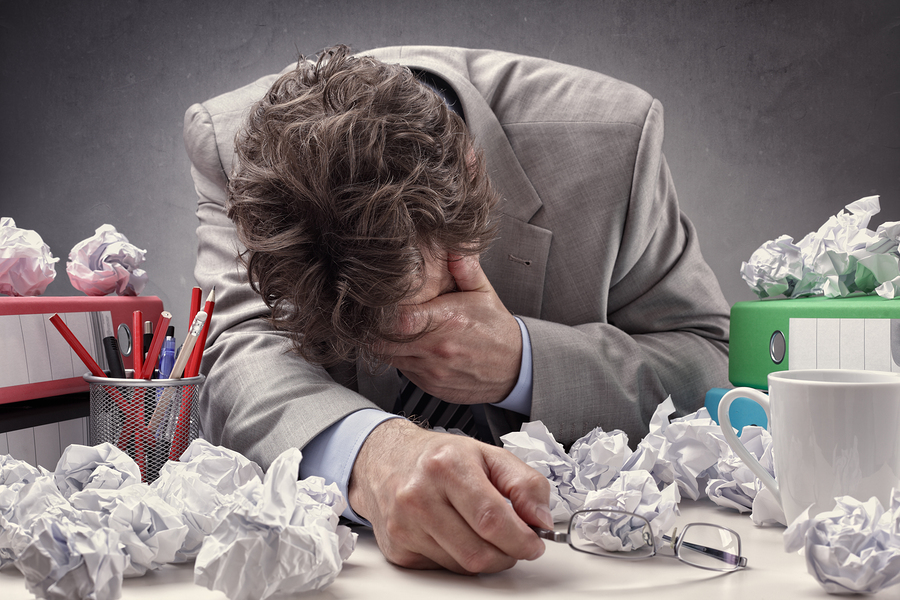‘Burnout syndrome’ officially recognised as a medical condition – here’s what you need to know
Yep, it’s a real thing. Even the World Health Organisation says so.
You know when you’ve been completely overworked and under-rested for far too long, and feel utterly emotionally and physically exhausted? Millennials have been using the phrase ‘burnout’ to describe this actually very common scenario for a while, and now it’s been added to the World Health Organisation’s (WHO) International Classification of Diseases.
So no, feeling ‘burned out’ by ongoing stressful work demands – and accepting the inevitable knock-on effect that has on our wellbeing, happiness and lives in general – is not OK, and we should probably all be taking it a bit more seriously.
What is burnout syndrome?
The WHO describes it as ‘resulting from chronic workplace stress that has not been successfully managed’.
They say it’s characterised by three things: Energy depletion or exhaustion, increased mental distance from your job or negative feelings about your job, and lastly, reduced professional efficacy.
They also note that ‘burnout refers specifically to phenomena in the occupational context’ and not experiences in other areas of your life outside of work.
GP for MedExpress, Dr Clare Morrison, says: “The word ‘burnout’ itself makes one think of combustion or over-heating, which is an apt description, because it leads to the sufferer being a shadow of their former self, unable to function as they did before.”
What causes it?
Morrison says it’s not only excessive workload or long working hours that can contribute to burnout, but also “lack of control, inadequate support from management, unclear job expectations and unfair treatment”.
And suffering from burnout certainly doesn’t mean you’re not tough enough at work, or that you’re not as good at the job as someone else is. “It’s more likely to affect those who normally work hard,” Morrison adds, “the high-achieving, conscientious, perfectionist sort of personality.
“It can also come on as a person ages, when it may be hard to keep up with younger colleagues.”
What to look out for
Morrison says: “Symptoms include anxiety, depression, irritability, fatigue, poor concentration, and forgetfulness. Low mood may be linked with apathy, loss of enjoyment, pessimism, isolation and self-doubt.”
It may manifest in physical ways too. You might have headaches, muscle pains, palpitations, dyspepsia (indigestion), and be more susceptible to infections, she explains.
There’s a knock-on effect too: “Burnout leads to poor performance, disturbance of relationships with coworkers and family, and poor health. There may also be a tendency to drink excessively and neglect oneself, which makes everything worse.”
So what can we do about it?
As with most things to do with our health and wellbeing, the important thing is to acknowledge that you’re actually suffering. “Don’t just try to ignore it,” warns Morrison. “Identify the underlying causes, and do as much as you can to eliminate them.
“Look at your contract and job description. Are you putting in more than your contracted hours and responsibilities? Set boundaries for the demands made on you. Learn to say ‘no’ to extra work that you don’t have time for. Reach out to others at work, and see if they are having similar problems. And make sure you have regular breaks, away from your desk.”
Although burn out is a work-related issue, having a healthy, balanced lifestyle (including good nutrition, regular exercise and some time spent outdoors) outside of the office can be instrumental in helping to support our work-selves too. In fact, prevention is always better than cure – and the effect of a balanced, healthy lifestyle shouldn’t be underestimated.
“Hobbies that use the creative side of your brain can help you switch off when you’re at home, and take your mind off work-related problems,” says Morrison.
“Don’t be afraid to seek professional help, to confirm the diagnosis. It may help to have some time off work, to take the immediate pressure off,” she adds. “Don’t underestimate how long you might need. If you are burnt out, it will have happened over a certain length of time, and recovery could take just as long, sometimes several months.
“In the long term, you may need a radical change to your whole lifestyle and career. If you feel your mental health is at risk, you may even need to change job altogether, go part-time, or reduce your level of responsibility, even if it means taking a pay cut.”
The Press Association
Latest posts by The Press Association (see all)
- How to attract more bees to your garden - May 3, 2024
- The costly insurance pitfalls to avoid when kitting out your garden this summer - May 3, 2024
- Gavin And Stacey’s best moments: From Smithy’s Indian takeaway to Pam eating ham - May 3, 2024
- Princess Charlotte ‘s ninth birthday marked by picture release - May 2, 2024
- Strong passwords more important than ever, experts warn - May 2, 2024





















